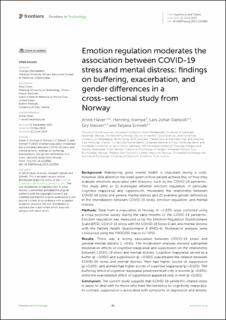| dc.contributor.author | Haver, Annie | |
| dc.contributor.author | Krampe, Henning | |
| dc.contributor.author | Danbolt, Lars Johan | |
| dc.contributor.author | Stålsett, Gry | |
| dc.contributor.author | Schnell, Tatjana | |
| dc.date.accessioned | 2024-02-07T11:36:19Z | |
| dc.date.available | 2024-02-07T11:36:19Z | |
| dc.date.created | 2023-06-22T11:45:15Z | |
| dc.date.issued | 2023 | |
| dc.identifier.citation | Frontiers in Psychology. 2023, 14 1-15. | en_US |
| dc.identifier.issn | 1664-1078 | |
| dc.identifier.uri | https://hdl.handle.net/11250/3116151 | |
| dc.description.abstract | Background: Maintaining good mental health is important during a crisis. However, little attention has been given to how people achieve this, or how they evaluate emotions associated with stressors, such as the COVID-19 pandemic. This study aims to (1) investigate whether emotion regulation, in particular cognitive reappraisal and suppression, moderates the relationship between COVID-19 stress and general mental distress and (2) examine gender differences in the interrelations between COVID-19 stress, emotion regulation, and mental distress. Methods: Data from a population in Norway (n = 1.225) were collected using a cross-sectional survey during the early months of the COVID-19 pandemic. Emotion regulation was measured using the Emotion Regulation Questionnaire Scale (ERQ), COVID-19 stress with the COVID-19 Stress Scale, and mental distress with the Patient Health Questionnaire 4 (PHQ-4). Moderation analyses were conducted using the PROCESS macro for SPSS. Results: There was a strong association between COVID-19 stress and general mental distress (r = 0.61). The moderation analyses showed substantial moderation effects of cognitive reappraisal and suppression on the relationship between COVID-19 stress and mental distress. Cognitive reappraisal served as a buffer (p = 0.001) and suppression (p = 0.002) exacerbated the relation between COVID-19 stress and mental distress. Men had higher scores of suppression (p < 0.001), and women had higher scores of cognitive reappraisal (p = 0.025). The buffering effect of cognitive reappraisal presented itself only in women (p < 0.001), while the exacerbation effect of suppression appeared only in men (p < 0.001). Conclusion: The current study suggests that COVID-19 pandemic-related stress is easier to deal with for those who have the tendency to cognitively reappraise. In contrast, suppression is associated with symptoms of depression and anxiety. The prevention of mental distress can be supported by guiding people about the importance of using healthy emotion regulation strategies, as well as helping them to become more aware of the way they interpret and regulate their emotions. Gender differences in emotion regulation suggest gender awareness, e.g., tailored programs for men and women. | en_US |
| dc.language.iso | eng | en_US |
| dc.rights | Navngivelse 4.0 Internasjonal | * |
| dc.rights.uri | http://creativecommons.org/licenses/by/4.0/deed.no | * |
| dc.title | Emotion regulation moderates the association between COVID-19 stress and mental distress: findings on buffering, exacerbation, and gender differences in a cross-sectional study from Norway | en_US |
| dc.title.alternative | Emotion regulation moderates the association between COVID-19 stress and mental distress: findings on buffering, exacerbation, and gender differences in a cross-sectional study from Norway | en_US |
| dc.type | Peer reviewed | en_US |
| dc.type | Journal article | en_US |
| dc.description.version | publishedVersion | en_US |
| dc.rights.holder | Forfatterne | en_US |
| dc.source.pagenumber | 1-15 | en_US |
| dc.source.volume | 14 | en_US |
| dc.source.journal | Frontiers in Psychology | en_US |
| dc.identifier.doi | 10.3389/fpsyg.2023.1121986 | |
| dc.identifier.cristin | 2157017 | |
| cristin.ispublished | true | |
| cristin.fulltext | original | |
| cristin.fulltext | original | |
| cristin.qualitycode | 1 | |

